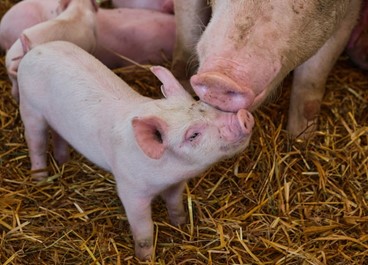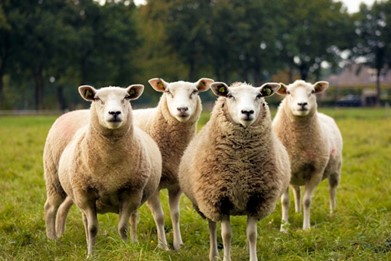Nikki Childrose of New York holds multiple roles at Columbia-Greene Community College, including Associate Professor of History, Division Chair of Technical Professions, and Academic Assessment Chair. She is dedicated to creating inclusive and engaging learning environments, focusing on student-centered instruction and authentic assessment methods. Her doctoral research explores innovative instructional practices at community colleges, reflecting her commitment to teaching, assessment, and institutional improvement. Outside of academia, she enjoys working on her farm, and serving the community with fresh, locally grown seasonal agricultural products. In the following article, Nikki Childrose delves into the importance of putting animal welfare first in small-scale farming operations, exploring humane practices that prioritize the well-being of animals while maintaining sustainable agricultural practices.
As societal consciousness around animal treatment in agriculture expands, so does the urgency for ethical farming practices, especially within small-scale operations. Consumers are now placing a heightened emphasis on animal welfare, prompting a critical re-evaluation of traditional farming methods.
Nikki Childrose of New York Explains the Importance of Animal Welfare in Farming
Animal welfare encompasses the physical and psychological well-being of animals raised for food production. Nikki Childrose of New York notes that in ethical farming, the welfare of animals is paramount, acknowledging their capacity to experience pain, pleasure, and suffering. Small-scale farmers have a unique opportunity to implement practices such as regenerative agriculture, fostering healthier, happier animals and producing high-quality products.

 Key Principles
Key Principles
Nikki Childrose of New York explains that providing animals with sufficient space to move, exercise, and engage in natural behaviors is
essential for their well-being. The practice of producing food in a way that protects the environment and public health ensures that animals are not confined to overcrowded or restrictive environments but instead have access to pasture or outdoor areas where they can roam freely.
Animals raised on ethical farms are fed a balanced diet that meets their nutritional needs. Nikki Childrose of New York says that access to clean, fresh water is also crucial for maintaining hydration and overall health. Small-scale farmers often prioritize providing high-quality feed and ensuring animals have access to clean water sources at all times.
Moreover, these farmers take preventative healthcare measures to promote animal health and prevent the spread of disease. This includes regular veterinary care, parasite control, and monitoring for signs of illness or injury. By addressing health issues proactively, farmers can minimize the need for antibiotics and other medications. Alternatively, many of the natural practices of animals, rotational grazing and keeping animal spaces hygienic, reduce the need for human intervention, preventing most illnesses.
Nikki Childrose of New York also notes that these practices aim to minimize stress and pain for animals throughout their lives. This includes handling animals gently, avoiding rough treatment or unnecessary stressors, and providing appropriate shelter and environmental enrichment. Techniques such as low-stress livestock handling and humane slaughter methods are employed to ensure animals are treated with respect and compassion.
Implementing Ethical Practices on Small-Scale Farms
Small-scale farmers play a crucial role in promoting ethical practices and setting a positive example for larger agricultural operations. By prioritizing animal welfare, these farmers can differentiate their products in the marketplace and build trust with consumers who value humane treatment of animals.
Rotational grazing is a common practice among small-scale livestock farmers, allowing animals to graze on fresh pasture while giving previously grazed areas time to recover. Nikki Childrose of New York notes that this promotes healthier pastures, reduces soil erosion, and provides animals with a diverse diet. Additionally, rotational grazing mimics natural grazing patterns, allowing animals to express their natural behaviors.
Pasture-based systems allow animals to graze on grass and forage, which are natural components of their diet. Small-scale growers prioritize rotational grazing and rotational cropping systems to ensure their animals have access to fresh pasture throughout the grazing season. Pasture-based systems promote animal health and welfare, minimize environmental impact, and produce nutrient-dense products.

Some small-scale farmers choose to pursue
animal welfare certifications to demonstrate their commitment to ethical farming practices. Certification programs such as
Animal Welfare Approved (AWA) or Certified Humane provide third-party verification of humane treatment standards, giving consumers confidence in the products they purchase.
Nikki Childrose of New York explains that small-scale farmers often have direct relationships with their customers, allowing them to educate consumers about their farming practices and the importance of animal welfare. Hosting farm tours, participating in farmers' markets, and engaging with local communities can help raise awareness and foster a deeper connection between consumers and the food they eat.
Conclusion
Ethical farming practices prioritize the well-being of animals, emphasizing compassion, respect, and stewardship of the land. In small-scale agriculture, farmers have the opportunity to implement humane practices that promote animal welfare while producing high-quality, sustainable food products. By embracing ethical farming principles and engaging with their communities, small-scale farmers can contribute to a more humane and sustainable food system.

 Key Principles
Nikki Childrose of New York explains that providing animals with sufficient space to move, exercise, and engage in natural behaviors is essential for their well-being. The practice of producing food in a way that protects the environment and public health ensures that animals are not confined to overcrowded or restrictive environments but instead have access to pasture or outdoor areas where they can roam freely.
Animals raised on ethical farms are fed a balanced diet that meets their nutritional needs. Nikki Childrose of New York says that access to clean, fresh water is also crucial for maintaining hydration and overall health. Small-scale farmers often prioritize providing high-quality feed and ensuring animals have access to clean water sources at all times.
Moreover, these farmers take preventative healthcare measures to promote animal health and prevent the spread of disease. This includes regular veterinary care, parasite control, and monitoring for signs of illness or injury. By addressing health issues proactively, farmers can minimize the need for antibiotics and other medications. Alternatively, many of the natural practices of animals, rotational grazing and keeping animal spaces hygienic, reduce the need for human intervention, preventing most illnesses.
Nikki Childrose of New York also notes that these practices aim to minimize stress and pain for animals throughout their lives. This includes handling animals gently, avoiding rough treatment or unnecessary stressors, and providing appropriate shelter and environmental enrichment. Techniques such as low-stress livestock handling and humane slaughter methods are employed to ensure animals are treated with respect and compassion.
Implementing Ethical Practices on Small-Scale Farms
Key Principles
Nikki Childrose of New York explains that providing animals with sufficient space to move, exercise, and engage in natural behaviors is essential for their well-being. The practice of producing food in a way that protects the environment and public health ensures that animals are not confined to overcrowded or restrictive environments but instead have access to pasture or outdoor areas where they can roam freely.
Animals raised on ethical farms are fed a balanced diet that meets their nutritional needs. Nikki Childrose of New York says that access to clean, fresh water is also crucial for maintaining hydration and overall health. Small-scale farmers often prioritize providing high-quality feed and ensuring animals have access to clean water sources at all times.
Moreover, these farmers take preventative healthcare measures to promote animal health and prevent the spread of disease. This includes regular veterinary care, parasite control, and monitoring for signs of illness or injury. By addressing health issues proactively, farmers can minimize the need for antibiotics and other medications. Alternatively, many of the natural practices of animals, rotational grazing and keeping animal spaces hygienic, reduce the need for human intervention, preventing most illnesses.
Nikki Childrose of New York also notes that these practices aim to minimize stress and pain for animals throughout their lives. This includes handling animals gently, avoiding rough treatment or unnecessary stressors, and providing appropriate shelter and environmental enrichment. Techniques such as low-stress livestock handling and humane slaughter methods are employed to ensure animals are treated with respect and compassion.
Implementing Ethical Practices on Small-Scale Farms Some small-scale farmers choose to pursue animal welfare certifications to demonstrate their commitment to ethical farming practices. Certification programs such as Animal Welfare Approved (AWA) or Certified Humane provide third-party verification of humane treatment standards, giving consumers confidence in the products they purchase.
Nikki Childrose of New York explains that small-scale farmers often have direct relationships with their customers, allowing them to educate consumers about their farming practices and the importance of animal welfare. Hosting farm tours, participating in farmers' markets, and engaging with local communities can help raise awareness and foster a deeper connection between consumers and the food they eat.
Conclusion
Ethical farming practices prioritize the well-being of animals, emphasizing compassion, respect, and stewardship of the land. In small-scale agriculture, farmers have the opportunity to implement humane practices that promote animal welfare while producing high-quality, sustainable food products. By embracing ethical farming principles and engaging with their communities, small-scale farmers can contribute to a more humane and sustainable food system.
Some small-scale farmers choose to pursue animal welfare certifications to demonstrate their commitment to ethical farming practices. Certification programs such as Animal Welfare Approved (AWA) or Certified Humane provide third-party verification of humane treatment standards, giving consumers confidence in the products they purchase.
Nikki Childrose of New York explains that small-scale farmers often have direct relationships with their customers, allowing them to educate consumers about their farming practices and the importance of animal welfare. Hosting farm tours, participating in farmers' markets, and engaging with local communities can help raise awareness and foster a deeper connection between consumers and the food they eat.
Conclusion
Ethical farming practices prioritize the well-being of animals, emphasizing compassion, respect, and stewardship of the land. In small-scale agriculture, farmers have the opportunity to implement humane practices that promote animal welfare while producing high-quality, sustainable food products. By embracing ethical farming principles and engaging with their communities, small-scale farmers can contribute to a more humane and sustainable food system.